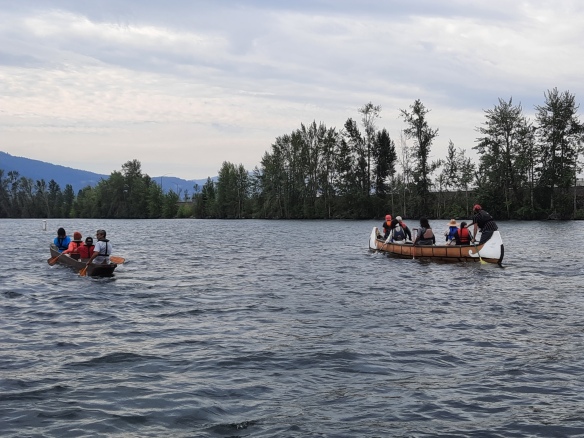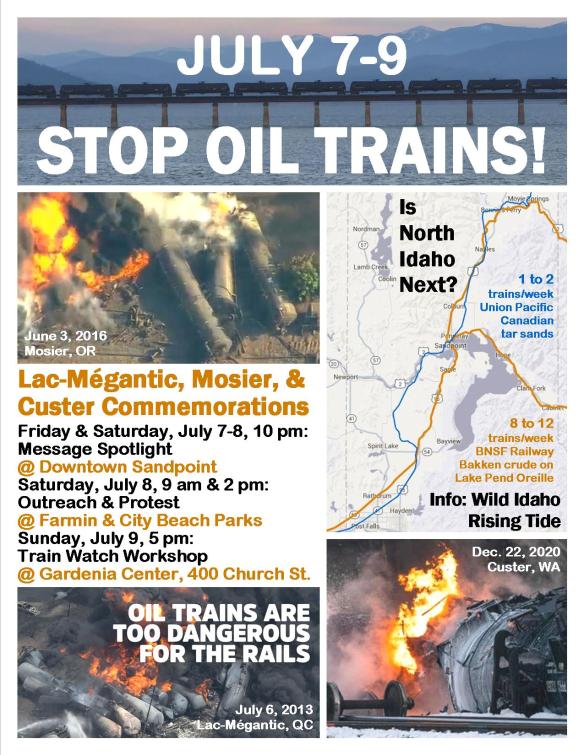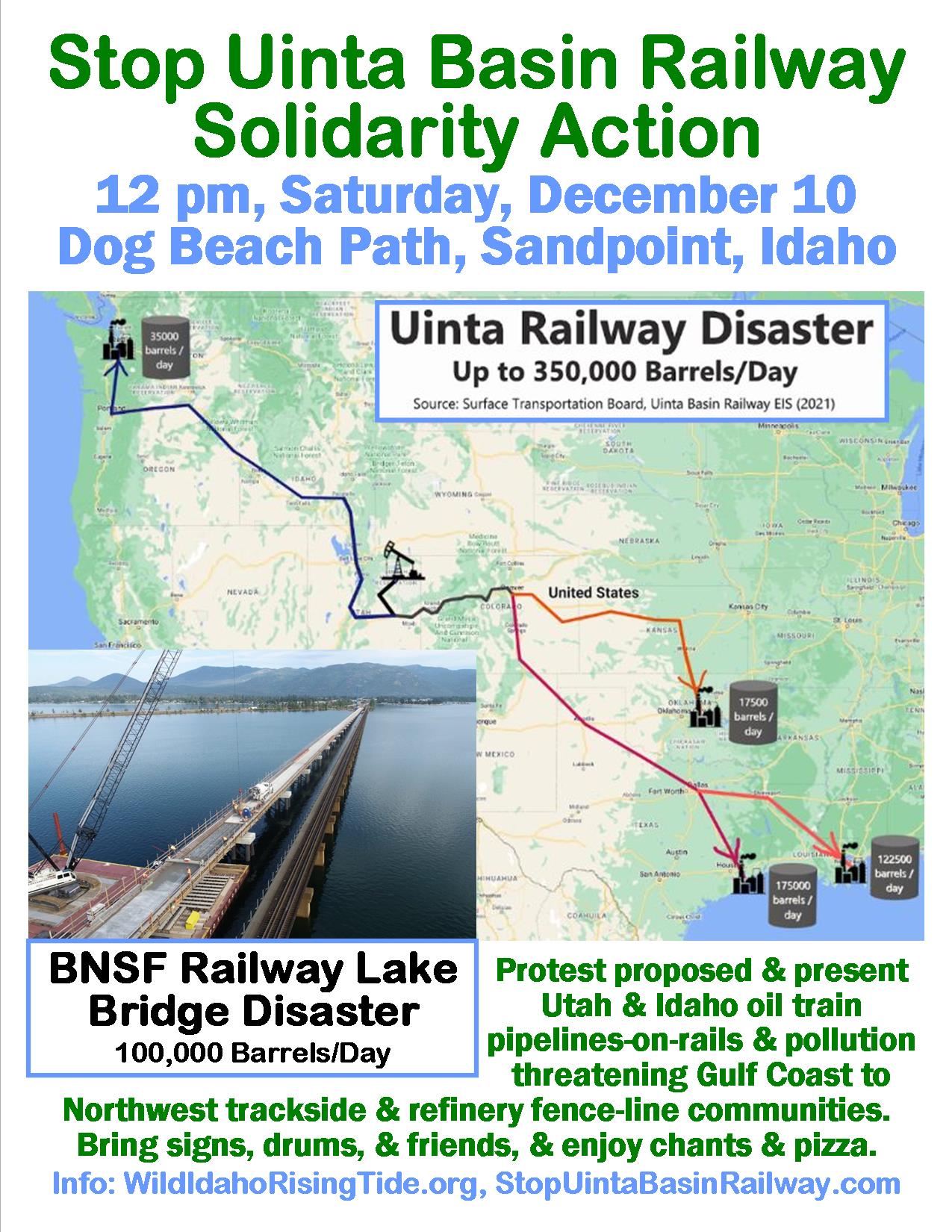…In conclusion, WIRT activists offer our perspectives and experiences of the constant pollution, noise, and terror that fossil fuels and hazardous materials trains violently and unilaterally impose on small, trackside communities: trauma that residents and businesses along all of the proposed Uinta Basin Railway routes will likely suffer if STB approves this project. In downtown Sandpoint, Idaho, the WIRT office overlooks the BNSF tracks only 700 feet away, well within the deadly, 2,640-foot blast zone of fiery, exploding, derailed, oil trains. This lakeside city endures about 60 trains per day on the rail line that BNSF is expanding to increase its traffic capacity up to 100 trains per day, including coal, oil, and other freight from converging Montana Rail Link (MRL) tracks, and in addition to cargo on the dangerously at-grade, bisecting, Union Pacific (UP) Railroad line.
As the largest, freight railroad network in North America, BNSF carries intermodal and manifest containers and bulk cargo, such as grain, coal, and crude oil, and burns the second largest volume of diesel fuel in the country, behind the U.S. Navy, spewing carcinogenic diesel emissions and toxic coal dust into the Clark Fork-Pend Oreille air and water sheds that contribute over 40 percent of the water to the Columbia Basin drainage. As WIRT and other Northwesterners have directly experienced, railroad accidents will predictably and profusely happen on Utah’s heedless, needless, oil train bridge to nowhere. Within much less than the length of the proposed Uinta Basin Railway, BNSF, MRL, and UP wrecked nine trains in four years, within a 50-mile radius of Sandpoint in north Idaho and western Montana. Major derailments and collisions included: 1) a fatal, UP crash into a vehicle with two teenagers in a Post Falls, Idaho, on February 7, 2017, 2) a mountainside slide toward a river dam of a UP, grain train above Moyie Springs, Idaho, on March 15, 2017, 3) a derailment over a washout into Lake Pend Oreille of an empty, BNSF-MRL, coal train in Ponderay, Idaho, on March 17, 2017, 4) another, injurious, UP encounter with teenagers in a vehicle in Rathdrum, Idaho, on April 13, 2017, 5) a BNSF, grain train wreck near a historic, Cocolalla, Idaho, barn on May 1, 2017, 6) a derailment and dump of 7,000 pounds of coal into a Heron, Montana, river reservoir with endangered fish on August 13, 2017, 7) the submersion, 2,000-gallon diesel spill, and cross-river removal of two BNSF, mixed freight train locomotives in the Kootenai River, upstream of an indigenous fish hatchery and Bonners Ferry, Idaho, on January 1, 2020, 8) a fire under a combustible, coal car in Sandpoint, on June 4, 2020, and 9) an empty, grain train collision with a loaded log truck near Samuels, Idaho, on Election Day, November 3, 2020 [23].
The January 1, $3.55 million, BNSF locomotive disaster, arguably the worst of all these accidents, may have caused downstream, drinking water contamination that has emerged during the last month. It also underscores the potential for all fossil-fueled trains, no matter their cargo, to inflict seemingly endless, reckless risks, endangerment, and damages on trackside communities, especially in river and lake valleys of the mountainous West prone to rock falls, mudslides, floods, and wildfires. But the February 13, 2020, CSX, ethanol/sand train crash into an eastern Kentucky landslide and river serves as a horrific omen of similarly possible, but more destructive, regional incidents involving oil trains moving through eastern Utah and crossing north Idaho [24]. Every day, BNSF hauls about three fully loaded, mile-long, volatile, Bakken crude oil trains along the remote, Highway 2 corridor, beside mountainous Glacier National Park and the Flathead River, and through rugged, Kootenai River canyons in Montana and north Idaho. If the January 2020, rockslide-caused, BNSF locomotives derailment, diesel fuel spill, and cross-river removal in endangered fish habitat had ignited and engulfed oil or ethanol tank cars, it could have trapped crew members in a flammable locomotive submerged in a fiery river, like the CSX crash. A similar scenario could arise instantaneously on the Uinta Basin Railway, among its more numerous oil trains.
Despite all of these railroad snafus, BNSF is risking additional, community harms with its construction since September 2019 of the 2.2-mile Sandpoint Junction Connector project in and near downtown Sandpoint, doubling tracks and building three parallel rail bridges beside a historic, active, passenger train station, over Sand Creek and Bridge Street to popular City Beach Park, and almost one mile across Lake Pend Oreille. Driving 1000-plus piles into lake and creek beds for temporary work barges and second railroad bridges, BNSF is accommodating passage of more derailment-vulnerable, bi-directional, and double-long trains through threatened bull trout critical habitat, regional drinking water, and accumulated railroad pollution. As with the Uinta Basin Railway proposal, grassroots, WIRT, #No2ndBridge, and allied activists continue to denounce, observe, photograph, and document this infrastructure expansion and increasing numbers of westbound, BNSF, unit coal and oil trains and derailments that jeopardize environmental and public health and safety, as these climate disrupters rampage otherwise idyllic, Northwest enclaves, toward West Coast export terminals and refineries. (excerpt)
WIRT Comments on Uinta Basin Railway Draft EIS 2-12-21
 On Monday, July 31, through Friday, August 4, Kalispel and regional tribal members and the River Warrior Society are holding the annual Remember the Water Kalispel Powwow canoe journey [1, 2]. The paddle usually voyages from Lake Pend Oreille and Qpqpe (Sandpoint), Idaho, to the Qlispe (Kalispel) Village in Cusick, Washington, during the week before the yearly Kalispel Powwow and around the time of the Festival at Sandpoint music concerts. In this cultural journey, families and friends are again paddling in traditional, dugout, wooden and sturgeon nose canoes, like their ancestors did for travel, fishing, and fun, over 50 miles through their home lands and waters among the tributaries, lake, and river of the Pend Oreille watershed.
On Monday, July 31, through Friday, August 4, Kalispel and regional tribal members and the River Warrior Society are holding the annual Remember the Water Kalispel Powwow canoe journey [1, 2]. The paddle usually voyages from Lake Pend Oreille and Qpqpe (Sandpoint), Idaho, to the Qlispe (Kalispel) Village in Cusick, Washington, during the week before the yearly Kalispel Powwow and around the time of the Festival at Sandpoint music concerts. In this cultural journey, families and friends are again paddling in traditional, dugout, wooden and sturgeon nose canoes, like their ancestors did for travel, fishing, and fun, over 50 miles through their home lands and waters among the tributaries, lake, and river of the Pend Oreille watershed.
 July 7-9 annual actions remember the Lac-Mégantic, Mosier, & Custer disasters
July 7-9 annual actions remember the Lac-Mégantic, Mosier, & Custer disasters
 Wild Idaho Rising Tide (WIRT) and climate activists throughout the West are organizing solidarity protests of oil trains and infrastructure, for a day of action against the Uinta Basin Railway (UBR), supporting campaigns against the Utah oil-by-rail scheme and in north Idaho, denouncing completion of BNSF Railway’s second, almost mile-long, rail bridge across the state’s largest, deepest lake: mountainous Lake Pend Oreille. Utah and Colorado comrades are calling for community-led actions on Saturday, December 10, 2022, to show that concerned citizens object to the devastating UBR project, and to pressure federal lawmakers, state representatives, and local governments to prevent building of the Uinta Basin Railway. They ask everyone to explore the #StopUintaBasinRailway action toolkit with information about the UBR and action coordination, sign a letter to Agriculture Department Secretary Tom Vilsack, demanding that he revoke the U.S. Forest Service permit for the railway, participate in actions happening in a dozen locations, register to join a remote phone bank on Tuesday, December 13, at 10 am Pacific time, and tell UBR opponents that you are interested in assisting this campaign [1-2].
Wild Idaho Rising Tide (WIRT) and climate activists throughout the West are organizing solidarity protests of oil trains and infrastructure, for a day of action against the Uinta Basin Railway (UBR), supporting campaigns against the Utah oil-by-rail scheme and in north Idaho, denouncing completion of BNSF Railway’s second, almost mile-long, rail bridge across the state’s largest, deepest lake: mountainous Lake Pend Oreille. Utah and Colorado comrades are calling for community-led actions on Saturday, December 10, 2022, to show that concerned citizens object to the devastating UBR project, and to pressure federal lawmakers, state representatives, and local governments to prevent building of the Uinta Basin Railway. They ask everyone to explore the #StopUintaBasinRailway action toolkit with information about the UBR and action coordination, sign a letter to Agriculture Department Secretary Tom Vilsack, demanding that he revoke the U.S. Forest Service permit for the railway, participate in actions happening in a dozen locations, register to join a remote phone bank on Tuesday, December 13, at 10 am Pacific time, and tell UBR opponents that you are interested in assisting this campaign [1-2]. On Tuesday, August 2, through Saturday, August 7, Kalispel and regional tribal members and the River Warrior Society are holding the annual Remember the Water canoe journey [1]. The paddle usually voyages between Qpqpe (Sandpoint, Idaho) and the Qlispe (Kalispel) Tribal Powwow Grounds, during the days before and beginning the yearly Kalispel Powwow and around the time of the Festival at Sandpoint music concerts. Families and friends are again paddling over 35 miles in traditional, dugout, wooden and sturgeon nose canoes, through their home lands and waters in the tributaries, lake, and river of the Pend Oreille watershed. While oil and gas pipeline expansions and fossil fuels pipeline-on-rails infrastructure and transportation impose and risk further harms to indigenous people and places across Turtle Island (North America), Native neighbors continue to revive, uphold, and practice their ancient cultures and sustainable ways, through admirable endeavors like this canoe journey and culminating powwow.
On Tuesday, August 2, through Saturday, August 7, Kalispel and regional tribal members and the River Warrior Society are holding the annual Remember the Water canoe journey [1]. The paddle usually voyages between Qpqpe (Sandpoint, Idaho) and the Qlispe (Kalispel) Tribal Powwow Grounds, during the days before and beginning the yearly Kalispel Powwow and around the time of the Festival at Sandpoint music concerts. Families and friends are again paddling over 35 miles in traditional, dugout, wooden and sturgeon nose canoes, through their home lands and waters in the tributaries, lake, and river of the Pend Oreille watershed. While oil and gas pipeline expansions and fossil fuels pipeline-on-rails infrastructure and transportation impose and risk further harms to indigenous people and places across Turtle Island (North America), Native neighbors continue to revive, uphold, and practice their ancient cultures and sustainable ways, through admirable endeavors like this canoe journey and culminating powwow. July 8-10 annual actions remember the Lac-Mégantic, Mosier, & Custer disasters
July 8-10 annual actions remember the Lac-Mégantic, Mosier, & Custer disasters Defend Paradise Ridge: Fund PRDC!
Defend Paradise Ridge: Fund PRDC! For the fifth annual, Remember the Water, canoe journey on August 4 through 7, 2021, Kalispel tribal members and friends are again portaging and paddling over 50 miles in dugout, wooden canoes, through their home lands and waters in the Pend Oreille lake and river watershed. They will tentatively begin from the Hope Peninsula on Wednesday, August 4, and/or re-start or initially launch from Sandpoint City Beach Park on Thursday morning, August 5, ultimately reaching their destination of the Kalispel Village in Cusick, Washington, on Saturday, August 7. Like during previous years, as depicted in linked photos and articles about prior paddles, Wild Idaho Rising Tide (WIRT) activists and area groups plan to welcome the travelers at Sandpoint, during possible journey arrival on Wednesday and departure on Thursday [1-9].
For the fifth annual, Remember the Water, canoe journey on August 4 through 7, 2021, Kalispel tribal members and friends are again portaging and paddling over 50 miles in dugout, wooden canoes, through their home lands and waters in the Pend Oreille lake and river watershed. They will tentatively begin from the Hope Peninsula on Wednesday, August 4, and/or re-start or initially launch from Sandpoint City Beach Park on Thursday morning, August 5, ultimately reaching their destination of the Kalispel Village in Cusick, Washington, on Saturday, August 7. Like during previous years, as depicted in linked photos and articles about prior paddles, Wild Idaho Rising Tide (WIRT) activists and area groups plan to welcome the travelers at Sandpoint, during possible journey arrival on Wednesday and departure on Thursday [1-9]. North Idaho activists invite everyone to participate in eighth annual, Stop Oil Trains and Pipelines training workshops and direct actions on Thursday, July 15, through Saturday, July 17. Five events honor and commemorate the 47 lives lost and downtowns devastated by oil train derailments, spills, explosions, and fires in the lakeside village of Lac-Mégantic, Quebec, on July 6, 2013, the Columbia River Gorge town of Mosier, Oregon, on June 3, 2016, the northwestern hamlet of Custer, Washington, on December 22, 2020, and all rail and pipeline corridor communities threatened and degraded by crude oil. This year, we also welcome your participation in protesting Line 3 tar sands pipeline construction through hundreds of water bodies, wild rice lakes, and treaty territories of Anishinaabe and Ojibwe indigenous nations in northern Minnesota.
North Idaho activists invite everyone to participate in eighth annual, Stop Oil Trains and Pipelines training workshops and direct actions on Thursday, July 15, through Saturday, July 17. Five events honor and commemorate the 47 lives lost and downtowns devastated by oil train derailments, spills, explosions, and fires in the lakeside village of Lac-Mégantic, Quebec, on July 6, 2013, the Columbia River Gorge town of Mosier, Oregon, on June 3, 2016, the northwestern hamlet of Custer, Washington, on December 22, 2020, and all rail and pipeline corridor communities threatened and degraded by crude oil. This year, we also welcome your participation in protesting Line 3 tar sands pipeline construction through hundreds of water bodies, wild rice lakes, and treaty territories of Anishinaabe and Ojibwe indigenous nations in northern Minnesota.